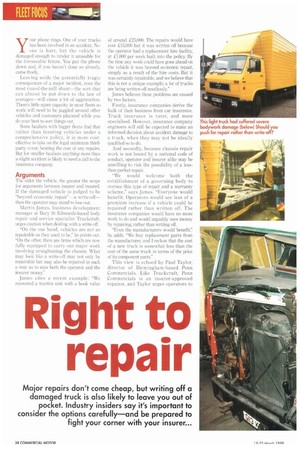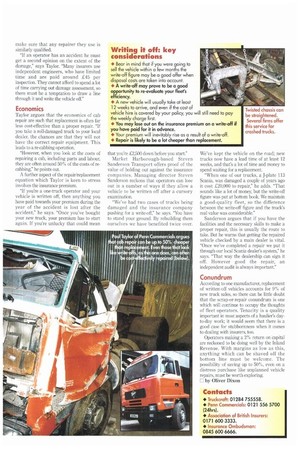Right to repair
Page 50

Page 51

If you've noticed an error in this article please click here to report it so we can fix it.
Major repairs don't come cheap, but writing off a damaged truck is also likely to leave you out of pocket. Industry insiders say it's important to consider the options carefully—and be prepared to fight your corner with your insurer...
your phone rings. One of your trucks has been involved in an accident. Noone is hurt, but the vehicle is damaged enough to render it unusable for the foreseeable future, You put the phone down and, if you haven't done so already, curse freely.
Leaving aside the potentially tragic consequences of a major incident, even the most run-of-the-mill shunt—the sort that can almost be put down to the law of averages—will cause a lot of aggravation. There's little spare capacity in most fleets so work will need to be juggled around other vehicles and customers placated while you do your best to sort things out.
Some hauliers with bigger fleets find that rather than insuring vehicles under a comprehensive policy, it is more costeffective to take on the legal minimum thirdparty cover, bearing the cost of any repairs. But for smaller hauliers anything more than a slight accident is likely to need a call to the insurance company.
Arguments
The older the vehicle, the greater the scope for arguments between insurer and insured. If the damaged vehicle is judged to be "beyond economic repair"— a write-off— then the operator may stand to lose out.
Martin James, business development manager at Bury St Edmunds-based body repair zind service specialist Truckeraft, urges caution when dealing with a write-off.
"On the one hand, vehicles are not as repairable as they used to be." he points out. "On the other, there are firms which are now fully equipped to carry out major work involving straightening the chassis. What may look like a write-off may not only be repairable but may also be repaired in such a way as to save both the operator and the insurer money."
James cites a recent example: "We recovered a tractive unit with a book value
of around £23,00). The repairs would have cost L15,000 but it was written off because the operator had a replacement hire facility, at .£1,000 per week built into the policy. By the time any work could have gone ahead on the vehicle it was beyond economic repair, simply as a result of the hire costs. But it was certainly repairable, and we believe that this is not a unique example; a lot of trucks are being written off needlessly."
James believes these problems are caused by two factors.
Firstly, insurance companies derive the bulk of their business from car insurance. Truck insurance is rarer, and more specialised. However, insurance company engineers will still be expected to make an informed decision about accident damage to a truck, when they may not be ideally qualified so to do.
And secondly, because chassis repair work is not bound by a national code of conduct, operator and insurer alike may be unwilling to risk the possibility of a lessthan-perfect repair.
"We would welcome both the establishment of a governing body to oversee this type of repair and a warranty scheme," says James. "Everyone would benefit. Operators would see less of a premium increase if a vehicle could be repaired rather than written off. The insurance companies would have no more work to do and would arguably save money by repairing, rather than writing off.
"Even the manufacturers would benefit," he adds. "We buy replacement parts from the manufacturer, and I reckon that the cost of a new truck is somewhat less than the cost of the same truck in terms of the price of its component parts."
This view is echoed by Paul Taylor, director of Birmingham-based Penn Commercials. Like Truckcraft, Penn Commercials is an insurer-approved repairer, and Taylor urges operators to make sure that any repairer they use is similarly qualified.
"If an operator has an accident he must get a second opinion on the extent of the damage," says Taylor. "Many insurers use independent engineers, who have limited time and are paid around per inspection. They cannot afford to spend a lot of time carrying out damage assessment, so there must be a temptation to draw a line through it and write the vehicle off."
Economics
Taylor argues that the economics of cab repair are such that replacement is often far less cost-effective than a proper repair. "If you take a roll-damaged truck to your local dealer, the chances are that they will not have the correct repair equipment. This leads to a re-cabbing operation.
"However, when you look at the costs of repairing a cab, including parts and labour, they are often around 50% of the costs of recabbing," he points out.
A further aspect of the repair/replacement equation which Taylor is keen to stress involves the insurance premium.
"If you're a one-truck operator and your vehicle is written off, then anything you have paid towards your premium during the year of the accident is lost after the accident," he says. "Once you've bought your new truck, your premium has to start again. If you're unlucky that could mean that you're £2,500 down before you start."
Market Harborough-based Steven Sanderson Transport offers proof of the value of holding out against the insurance companies. Managing director Steven Sanderson reckons that operators can lose out in a number of ways if they allow a vehicle to be written off after a cursory examination.
"We've had two cases of trucks being damaged and the insurance company pushing for a write-off," he says. "You have to stand your ground. By rebuilding them ourselves we have benefited twice over. We've kept the vehicle on the road; new trucks now have a lead time of at least 12 weeks, and that's a lot of time and money to spend waiting for a replacement.
"When one of our trucks, a J-plate 113 Scania, was damaged a couple of years ago it cost £20,000 to repair," he adds. "That sounds like a lot of money, but the write-off figure was put at bottom book. We maintain a good-quality fleet, so the difference between the write-off figure and the truck's real value was considerable."
Sanderson argues that if you have the facilities and the necessary skills to make a proper repair, this is usually the route to take. But he warns that getting the repaired vehicle checked by a main dealer is vital. "Once we've completed a repair we put it through our local Scania dealer's system," he says. "That way the dealership can sign it off. However good the repair, an independent audit is always important."
Conundrum
According to one manufacturer, replacement of written-off vehicles accounts for 9% of new truck sales, so there can be little doubt that the scrap-or-repair conundrum is one which will continue to occupy the thoughts of fleet operators. Tenacity is a quality important in most aspects of a haulier's clayto-day work; it would seem that there is a good case for stubbornness when it comes to dealing with insurers, too.
Operators making a 2% return on 'capital are reckoned to be doing well by the Inland Revenue. With margins as low as this, anything which can be shaved off the bottom line must be welcome. The possibility of saving up to 50%, even on a distress purchase like unplanned vehicle repairs, must be worth exploring.
E by Oliver Dixon
Writing it off: key considerations
• Bear in mind that if you were going to sell the vehicle within a few months the write-off figure may be a good offer when disposal costs are taken into account.
• A write-off may prove to be a good opportunity to re-evaluate your fleet's efficiency.
• A new vehicle will usually take at least 12 weeks to arrive, and even if the cost of vehicle hire is covered by your policy, you will still need to pay the weekly charge first.
• You may lose out on the insurance premium on a write-off if you have paid for it in advance. • Your premium will inevitably rise as a result of a write-off. • Repair is likely to be a lot cheaper than replacement.
Contacts
• Truckcraft: 01284 755558.
• Penn Commercials: 0121 556 5700 (24hrs).
• Association of British Insurers: 0171 600 3333.
• Insurance Ombudsman: 0845 600 6666.




























































































































